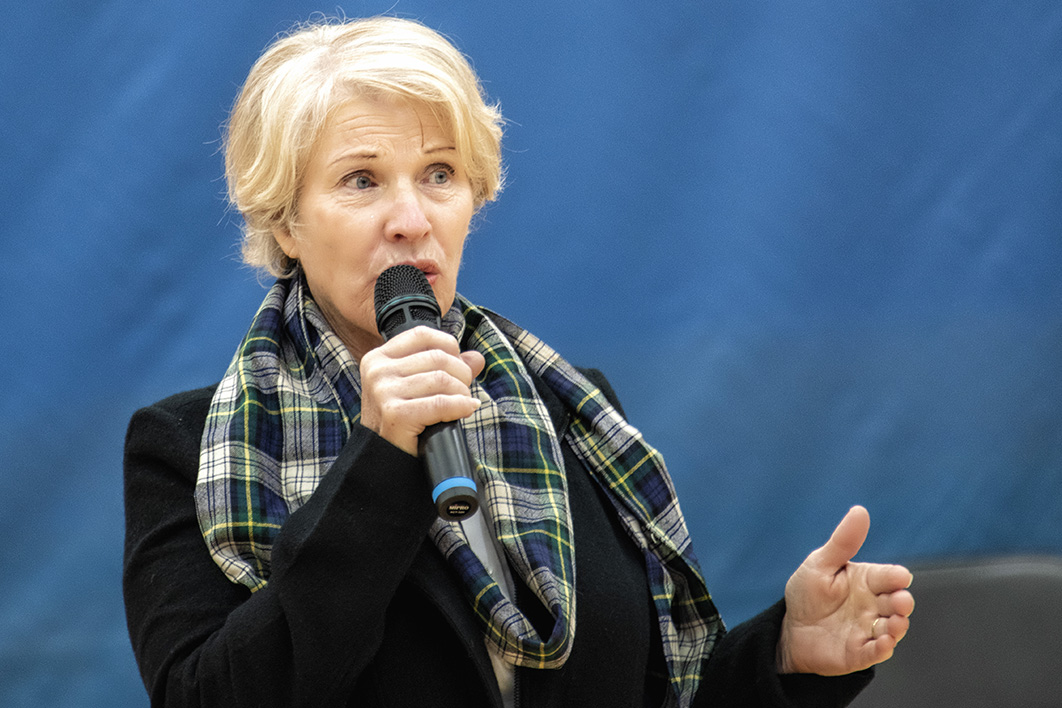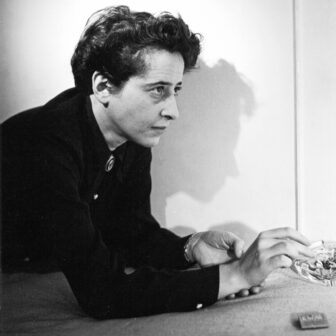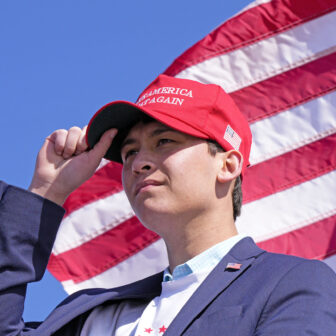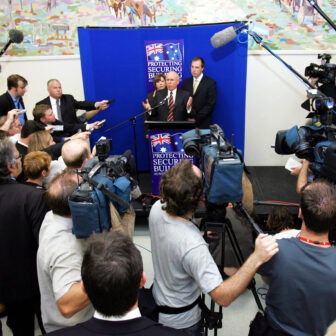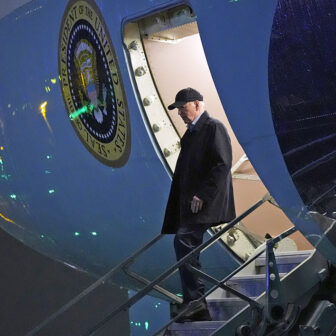The cavernous Veolia Arena in the NSW town of Goulburn usually echoes to the sound of hard-fought basketball or volleyball matches, and even martial arts cage-fighting. But today it’s hosting the opening round of a political contest two years in the making.
Inspired by the success of independents like Cathy McGowan in the Victorian seat of Indi, a community group called Voices of Hume was established back in 2019 to find a candidate to take on the sitting member for the federal electorate of Hume, Angus Taylor. Hume stretches from Sydney’s southwestern edge down to Goulburn and west into the farmlands around Gunning, Crookwell and Boorowa. And Taylor, of course, is industry, energy and emissions reduction minister, and one of the Morrison government’s more controversial senior members.
On this unseasonably chilly Saturday morning in November about 350 people — rugged up against the cold and masked against Covid-19 — have gathered courtside at the arena to show their support for the fruit of this search: a local Goulburn woman named Penny Ackery.
As the TV presenter Julia Zemiro warms up the crowd, volunteers move among them armed with plastic buckets asking for donations. I don’t see any coins being offered; these people are serious; they’re dropping in twenties and fifties.
It’s then that I notice the candidate. She’s leaning quietly against a table off to one side, her booted feet crossed at the ankle, wearing a tartan scarf and a long warm coat, as she waits to be introduced. She’s a diminutive woman in her sixties, but looks younger.
When Zemiro invites her to speak, Ackery is carried to centre court on a wave of applause. Just like Zemiro, who’s a skilled professional, Ackery picks up the microphone and walks as she talks, speaking off-the-cuff for thirty minutes.
“This is not just the launch for the independent candidate for Hume,” she tells the crowd. “This is also the relaunching, the rekindling, of our democracy. Our government works in a vacuum. Our government is distant from us. And it is us, all of us, who should be directing and guiding how our future works out.”
Ackery is “extremely humbled that so many people are putting their trust in me,” she tells us, “and it’s a huge responsibility. But I’m ready for it — and I’m even more ready for it now because all of you are telling me that ‘Yes, this is what we need to do.’”
Ackery and the Voices of Hume team have clearly thought hard about what they’re doing. All the attendees today are given “Vote One Penny Ackery 2022” t-shirts, which they’re encouraged to wear to their local shops, to start conversations. They’re given two bumper stickers — one for their car and one for a friend’s. They’re asked to post their snaps of the event on Facebook and Twitter.
There’s a bit of showbiz pizzazz, a good-sized crowd, punchy speeches and, most importantly, at the heart of it all, an engaging, articulate candidate. All in all, it’s an accomplished launch.
All political endeavours like this one start with a surge of optimism. But the enthusiasm can be hard to maintain. The next election could be as late as May 2022. It’s going to be a long haul. So, who is Penny Ackery, and how far can she go?
Born near West Wyalong in south-central New South Wales, Ackery is steeped in country life. Her father’s job teaching in tiny bush schools took the family around the state. Later she studied arts at ANU; then she went to Sydney Teachers’ College and followed her father into the profession. She’s worked in education since the early 1980s, mainly as a special education teacher in secondary schools, working with kids who struggled in mainstream classes.
Ackery is married to a former electrician who retrained as a teacher, and has an adult son. After years of working in the city, she tells me, she was drawn back to the country by the sense of community life on offer in the bush. The family first bought a small property on the outskirts of Goulburn more than thirty years ago. She’s worked at local high schools in the electorate for well over a decade, including Picton High and Goulburn High.
Though a neophyte in politics, Ackery has some useful local contacts she can activate to gather support. As well as being known to her fellow teachers, and her students and their parents, she is a keen bushwalker and helped to establish the South Coast Bushwalking Club. She is also a member of the local council’s sustainability working party and is involved with local pony clubs, where she volunteers as an event judge. From these sorts of threads, a committed independent candidate can begin to knit together a network of volunteers and fundraisers.
Between now and early next year Ackery says she’ll be spending her time travelling around the electorate, attending morning teas and gatherings organised by many of the people who attended her campaign launch.
“Besides my own networks there are people jumping out of the woodwork wanting to host things, people I’ve never met before who came along to the launch. They see a real value in doing this,” she says.
If she’s lucky, these meet-and-greets will set off a chain reaction of teas and scones and backyard barbeques across the electorate. She is clearly hoping that her feelings about the state of Australian politics are held by many of the voters in Hume.
“I think one of the big things that people are really feeling is that they feel disconnected from government,” she says. “Can-do capitalism — that’s fine for the capitalists but not much good for people working on the ground. They feel like it’s not really happening for them anymore, they’re not being considered.”
She professes to be “amazed” at the passion she is picking up among locals. “You know, they really want things to change. It’s been remarkable finding out that I’m not the only one that thinks things should change, that there’s a whole bunch of us, and that’s really heartening.”
Like many of her fellow independent candidates Ackery is concerned that the federal government is not working diligently enough to combat climate change, create a tough federal anti-corruption watchdog or reform political donation laws. But she also has many concerns specific to a seat like Hume. She wants to help small businesses flourish and is keen to tackle those traditional bugbears of rural seats everywhere: mobile phone coverage and the quality of country roads.
For an independent, just getting out of the starting blocks is difficult. As the German sociologist Max Weber famously put it, “Politics is a strong and slow boring of hard boards.” The prospects for Ackery’s campaign might look daunting, but as Weber also pointed out, less famously, “Man would not have attained the possible unless time and again he had reached out for the impossible.”
Ackery is clearly the underdog. Taylor holds the seat with a hefty 13 per cent margin. But if she can force the election to preferences, she may just have a chance. Labor and the Greens together got over 30 per cent of the primary vote in Hume at the 2019 election. That’s a fair few preferences that might flow her way.
Ackery is the independent candidate from central casting. She’s a political cleanskin, having never been a member of a political party or run for office. She is a mainstream Australian. “I’m not crashingly left or crashingly right. I’m pretty much in the centre,” she tells me, which will be important in a traditionally conservative seat like Hume.
She is also energetic, positive and genuine: key ingredients in expanding her support base one morning tea at a time. She likes meeting people and she’s personally engaging. And she’s learnt some valuable lessons from Cathy McGowan, the doyenne of Australia’s independent MPs, who is clearly a mentor.
McGowan had driven up the Hume Highway from her home in the northern Victorian seat of Indi to lend her support to Ackery at the Goulburn launch. “I am here today because Penny invited me. She asked, would I come,” McGowan told the crowd. “No money exchanged hands; no deals were made. A simple invitation, and I said yes.”
Her presence underlined the point that it’s possible to win from a standing start, as she did. She also answered the question that many Hume voters will ask: why vote independent? Simply, by voting for an independent, she said, Indi “got noticed.”
“Indi got a seat at the table. The big table in parliament, the many smaller tables in ministers’ offices, and the many other tables where decisions are made,” McGowan explained. “We were no longer taken for granted because we were a safe seat. Now we mattered. And we get things – infrastructure, services. We get noticed; we get heard.”
In her memoir Cathy Goes to Canberra, McGowan tells how she once met a potential supporter at a function who accused her of not really wanting to win. The comment struck home because McGowan knew she was wavering. And then a revelation hit her: the most important person to convince that you really are “in it to win it” is yourself.
In that moment, McGowan committed fully to what she was attempting to do. And she went on to win Indi — first in 2013 and then again in 2016. And then she helped hand on the seat to her fellow independent Helen Haines in 2019.
When I raise this passage from McGowan’s book with Ackery she tells me she remembers it clearly and had taken it seriously. As she told her crowd of supporters, “Can we win? Well, yes, we’re going to win, there’s no doubt about that. And we can win because there’s a wonderful growing independents movement that has paved the way, so that we know how to act, and what things need to be done.”
The day after the launch, Angus Taylor went on the front foot. “People are entitled to run, and I respect that,” he told the ABC. “But sadly, this is just another front for green activists to play dress-up as independents, as we are seeing around the country.”
Questioning the motives of his new opponent — an authentic female political voice with deep roots in his electorate’s community — might not be the wisest strategy for Taylor to pursue. And there’s also the fact that old hands at the teaching game like Ackery can be firm when it comes to putting naughty boys in their place.
Ackery used Twitter to quickly and crisply reject the idea that Voices of Hume was a front for any party or group. “Angus,” she added, no doubt with climate change in mind, “the time for shirking your responsibilities is ending.” •
The publication of this article was supported by a grant from the Judith Neilson Institute for Journalism and Ideas.
